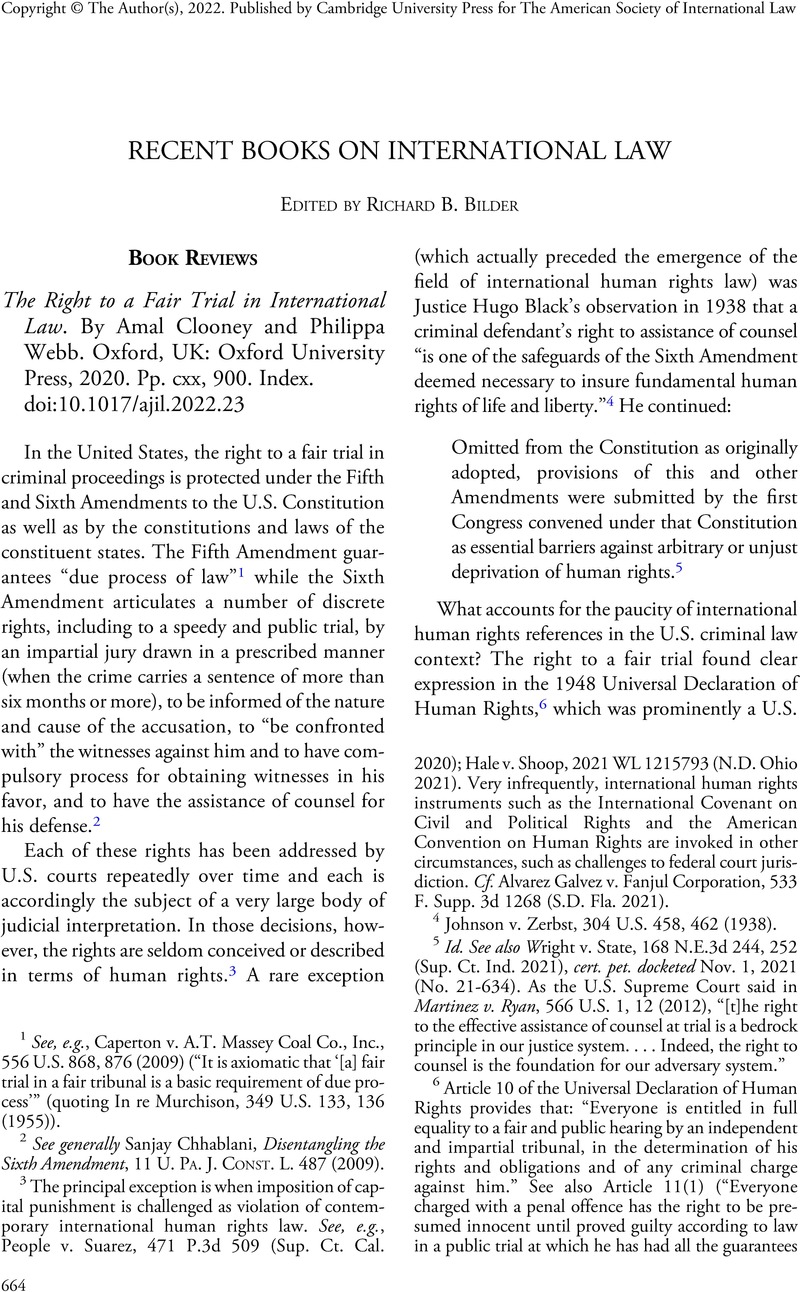No CrossRef data available.
Published online by Cambridge University Press: 28 July 2022

1 See, e.g., Caperton v. A.T. Massey Coal Co., Inc., 556 U.S. 868, 876 (2009) (“It is axiomatic that ‘[a] fair trial in a fair tribunal is a basic requirement of due process’” (quoting In re Murchison, 349 U.S. 133, 136 (1955)).
2 See generally Chhablani, Sanjay, Disentangling the Sixth Amendment, 11 U. Pa. J. Const. L. 487 (2009)Google Scholar.
3 The principal exception is when imposition of capital punishment is challenged as violation of contemporary international human rights law. See, e.g., People v. Suarez, 471 P.3d 509 (Sup. Ct. Cal. 2020); Hale v. Shoop, 2021 WL 1215793 (N.D. Ohio 2021). Very infrequently, international human rights instruments such as the International Covenant on Civil and Political Rights and the American Convention on Human Rights are invoked in other circumstances, such as challenges to federal court jurisdiction. Cf. Alvarez Galvez v. Fanjul Corporation, 533 F. Supp. 3d 1268 (S.D. Fla. 2021).
4 Johnson v. Zerbst, 304 U.S. 458, 462 (1938).
5 Id. See also Wright v. State, 168 N.E.3d 244, 252 (Sup. Ct. Ind. 2021), cert. pet. docketed Nov. 1, 2021 (No. 21-634). As the U.S. Supreme Court said in Martinez v. Ryan, 566 U.S. 1, 12 (2012), “[t]he right to the effective assistance of counsel at trial is a bedrock principle in our justice system. . . . Indeed, the right to counsel is the foundation for our adversary system.”
6 Article 10 of the Universal Declaration of Human Rights provides that: “Everyone is entitled in full equality to a fair and public hearing by an independent and impartial tribunal, in the determination of his rights and obligations and of any criminal charge against him.” See also Article 11(1) (“Everyone charged with a penal offence has the right to be presumed innocent until proved guilty according to law in a public trial at which he has had all the guarantees necessary for his defence.”) and Article 11(2) (“No one shall be held guilty of any penal offence on account of any act or omission which did not constitute a penal offence, under national or international law, at the time when it was committed. Nor shall a heavier penalty be imposed than the one that was applicable at the time the penal offence was committed.”). See GA Res. 217 A (III), Universal Declaration of Human Rights (Dec. 10, 1948), at https://www.un.org/en/about-us/universal-declaration-of-human-rights.
7 See, e.g., Wolf v. Idaho State Board of Correction, No. 20-35600, 2021 WL 3721434 (9th Cir. Aug. 23. 2001), noting that the ICCPR was ratified on a “non-self-executing” basis. That fact does not, however, preclude reference by counsel or courts to its provisions, which bind the United States as a matter of international law.
8 The decisional case law of various national jurisdictions is only occasionally referred to in the volume as representing “best practices,” and one will not find any extensive discussion of relevant U.S. law.